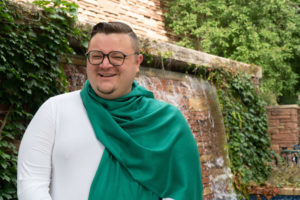
Alex C. Lange, assistant professor of higher education leadership in the Colorado State University School of Education, and their collaborators have been awarded a $500,000 grant from the Spencer Foundation to launch a first-of-its-kind, national study examining how LGBTQ+ students thrive in college.
When researching marginalized populations, people are often viewed through a deficit model, according to Lange. “Many folks look at LGBTQ+ students and see them as victims or automatically deficient,” they said. “On college campuses, we often talk about unsupportive faculty or staff and unwelcoming campus climates. Instead, we want to examine how LGBTQ+ students carve out their own success, develop community, and learn what they need to succeed in school and life.”
Expanding the scope
Research finds that transgender students often create kinship networks in college. “Kinship networks represent chosen family, which is vital to LGBTQ+ students,” Lange said. “We want to look at the strengths LGBTQ+ students bring with them to college and how that helps them thrive in environments where they might not otherwise, and how they create their own forms of success.”
Most national databases used to understand college students do not meaningfully collect sexual orientation or gender identity information, and those that do, often offer a single snapshot in time, and don’t follow up or track people’s experiences.
Lange’s study will change that. “We are trying to address that concern in our study by having more statistical power and explanation behind our work,” they said.
With this funding, Lange and their collaborators will cast a wider net than previous studies and follow the same students over time from all kinds of institutions – large land-grants like CSU, Historically Black Colleges and Universities, and small liberal arts colleges.
“No one has been able to do something of the scale quite yet,” Lange enthusiastically said of taking up the challenge. They hope this larger-scale approach will lead to an impact that is wide-reaching and public facing.
Impact beyond journal articles
While the research team will submit articles with their findings for publication in academic journals, they also plan to develop policy briefs for government policymakers, toolkits for campus practitioners, and guides for students themselves.
Lange emphasized the importance of this research in the context of the challenges and harm being brought to LGBTQ+ individuals. “As researchers at land-grant institutions, we are charged with doing research in the public’s interest,” they said. “We are seeing attacks on transgender people, and states passing laws that target transgender folks and affect various levels of education that include book banning and discussions around queer identities,” they said.
“We are collecting data at a ripe time to understand the effect these bans and legislation may have on students,” Lange said.
“Will they think about their college choice process differently? How might students push back? We also will search for clear actions faculty, staff, administrators, and student peers can take to move past surface-level allyship to truly create campus communities where all LGBTQ+ students feel welcomed, affirmed, and naturally able to succeed.”
Jodi Linley, associate professor of higher education and student affairs at the University of Iowa, and Cindy Ann Kilgo, associate professor of higher education and student affairs at Indiana University are the two other researchers working with Lange on the project.
Lange is thrilled about receiving the grant. Before becoming a faculty member, they worked full-time supporting the LGBTQ+ population in community contexts and on college campuses. “This perspective gives me good ways of thinking about how research and practice work in tandem to facilitate good outcomes for LGBTQ+ folks. I am thankful the Spencer Foundation recognizes the importance of this work, especially in the contemporary moment we find ourselves in as people in the U.S.”
The School of Education is part of CSU’s College of Health and Human Sciences.